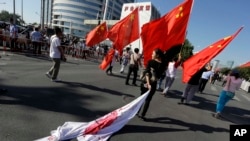In 2012, the Chinese film industry produced numerous movies and television dramas with anti-Japanese themes, many of them dealing with the two wars between the countries. The trend seems set to continue in 2013, with at least nine anti-Japan productions in progress.
According to a report in the Guangzhou-based Yangcheng Evening News, Hengdian World Studio, known as China’s Hollywood, produced between 40 and 50 such shows last year alone. The newspaper estimated the number of deaths of Japanese depicted in the dramas to be one billion over the course of the entire year.
The newspaper said the production quality of many of the productions is not sophisticated, and that some the action shown is so preposterous as to elicit laughter from the audience. In one drama, for example, Chinese are portrayed as having the power to cut Japanese in half with their bare hands.
But while the dramas may appear fantastical or even amateurish, they do serve a very real purpose.
According to Doug Young, a journalism professor at Fudan University in Shanghai and author of the new book The Party Line: How the Media Dictates Public Opinion in Modern China, fanning anti-Japanese sentiment can be very useful for the government in Beijing.
“It’s a convenient way to rally the Chinese around the flag and deflect attention away from scandals like Bo Xilai and corruption,” he said. “It’s a good opportunity to make people proud to be Chinese.”
Young added that latent resentment toward Japan makes it easy to stir up the population.
“The Chinese government knows it’s there, and it uses that latent distrust to its advantage when it runs into issues with Japan like the Diaoyu Islands,” he said. “In the case of Japan, it’s a very deliberate effort by the [Chinese] Propaganda Department not to stop inflammatory discussions and maybe fan the flames. They let people break the laws and do things that would never be tolerated otherwise.” he said.
Last fall, after Japan nationalized the disputed Senkaku/Diaoyu islands, which are claimed by China, anti-Japanese sentiment erupted throughout China, with widespread looting and vandalism of Japanese businesses as well as calls to boycott Japanese products.
“Whenever you need a good bad guy in the United States, you can never go wrong bringing in a Nazi,” said Young. “It’s the same way in China. You can never go wrong vilifying the Japanese, and they take advantage of that fact.”
Additional reporting by Yi-Hua Lee of VOA's China Branch
According to a report in the Guangzhou-based Yangcheng Evening News, Hengdian World Studio, known as China’s Hollywood, produced between 40 and 50 such shows last year alone. The newspaper estimated the number of deaths of Japanese depicted in the dramas to be one billion over the course of the entire year.
The newspaper said the production quality of many of the productions is not sophisticated, and that some the action shown is so preposterous as to elicit laughter from the audience. In one drama, for example, Chinese are portrayed as having the power to cut Japanese in half with their bare hands.
But while the dramas may appear fantastical or even amateurish, they do serve a very real purpose.
According to Doug Young, a journalism professor at Fudan University in Shanghai and author of the new book The Party Line: How the Media Dictates Public Opinion in Modern China, fanning anti-Japanese sentiment can be very useful for the government in Beijing.
“It’s a convenient way to rally the Chinese around the flag and deflect attention away from scandals like Bo Xilai and corruption,” he said. “It’s a good opportunity to make people proud to be Chinese.”
Young added that latent resentment toward Japan makes it easy to stir up the population.
“The Chinese government knows it’s there, and it uses that latent distrust to its advantage when it runs into issues with Japan like the Diaoyu Islands,” he said. “In the case of Japan, it’s a very deliberate effort by the [Chinese] Propaganda Department not to stop inflammatory discussions and maybe fan the flames. They let people break the laws and do things that would never be tolerated otherwise.” he said.
Last fall, after Japan nationalized the disputed Senkaku/Diaoyu islands, which are claimed by China, anti-Japanese sentiment erupted throughout China, with widespread looting and vandalism of Japanese businesses as well as calls to boycott Japanese products.
“Whenever you need a good bad guy in the United States, you can never go wrong bringing in a Nazi,” said Young. “It’s the same way in China. You can never go wrong vilifying the Japanese, and they take advantage of that fact.”
Additional reporting by Yi-Hua Lee of VOA's China Branch











